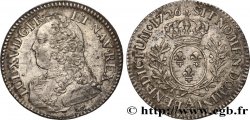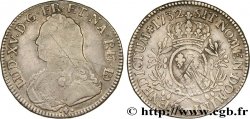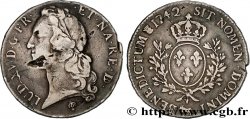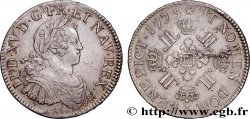Obverse
Obverse legend : LUD. XV. D. G. FR. - .ET. NA. RE. (D ET B LIÉS)..
Obverse description : Tête à gauche de Louis XV, ceinte d'un bandeau ; sous la tête (Mm).
Obverse translation : (Louis XV, par la grâce de Dieu, roi de France et de Navarre, seigneur de Béarn).
Reverse
Reverse legend : .SIT NOMEN DOMINI - (VACHE) - BENEDICTUM (MG) 1768.
Reverse description : Écu de France ovale, couronné entre deux branches d'olivier.
Reverse translation : (Béni soit le nom du Seigneur).
Historical background
LOUIS XV THE BELOVED
(01/09/1715-10/05/1774)
Born in Versailles in 1710, Louis XV was the son of Louis, Duke of Burgundy, and Marie-Adélaïde de Savoie. He succeeded his great-grandfather in 1715, due to the premature death of his grandfather, the Grand Dauphin, and his father. During the king's minority, the regency fell to Philippe, Duke of Orléans, nephew of Louis XIV.. After an unfortunate attempt at government by councils replacing the secretaries of state (the Polysynodie, 1715-1718), the regent returned to the maxims of his uncle and preserved the monarchical authority. The real novelties of the regency were in the failed attempt at economic and financial reform (Law's system) and in a liberalization of morals and a different orientation of literature, in reaction against the rigorism of the previous century.. Major, Louis XV was crowned in Reims in 1722. Then succeeded each other as Prime Ministers: the Duke of Orléans (1722-1723), the Duke of Bourbon (1723-1726) and the Cardinal de Fleury, former tutor to the king (1726-1743). This period was marked by the War of the Polish Succession (1733-1738), which allowed France to place the dethroned King of Poland, Stanislas, father-in-law of Louis XV, at the head of Lorraine and, eventually, to seize the duchy. The ministry of Fleury, of peaceful spirit, was for France a period of recovery after the hardships of the previous reign.. Begun under Fleury, the War of Austrian Succession (1741-1748) had less happy results, the Peace of Aix-la-Chapelle making us renounce the conquests of Maurice of Saxony in the Netherlands. It was during this war that Louis, having begun to govern, experienced the peak of his popularity, especially during his illness in Metz (1744). The Seven Years' War (1756-1763) will be completely disastrous. At the Treaty of Paris, France loses Canada and the Indies. The annexation of Corsica, in 1769, was a belated and minor success. England were triumphant in their age-old fight for Atlantic dominance. The Austrian alliance had proved to be of little use and the emergence of Prussia made a new threat appear, the full extent of which was revealed in the following century.. Inside, the successive ministries ran up against the opposition of the parliaments, in particular of the Parliament of Paris, and with the permanence of the Jansenist movement. The policy of firmness carried out between 1770 and 1774, could not redeem the hesitations of the previous decades. In this Age of Enlightenment, the gap between the old monarchical religion and the authoritarian practice of power, on the one hand, and the evolution of minds and mores, on the other, never stopped growing.. The royal power froze in the servile repetition of the maxims of government proper to Louis XIV.. Louis XV and Louis XVI did not have the aura of their ancestor: they floated in this coat of glory too loose for them. From the inside, the "old machine" gave signs of disorder, instability and simultaneous ministerial despotism, reign of the favorites. A malaise appeared in the elites; the nobility, the office, the military service were no longer the sure values of the past. Public opinion became a force. While the political power tended to immobility, the administrative machine, it was modernized, for the sake of control, measure, good management. The reign of Louis XV was for France an era of prosperity and economic development, at the same time as that of an extreme flowering of the arts, letters and sciences.. From Marie Leczynska, married in 1725, Louis XV had a son, Louis, born in 1729, who died in 1765, leaving himself three sons: the future Louis XVI, Louis XVIII and Charles X.










 Report a mistake
Report a mistake Print the page
Print the page Share my selection
Share my selection Ask a question
Ask a question Consign / sell
Consign / sell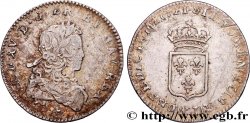
 Full data
Full data